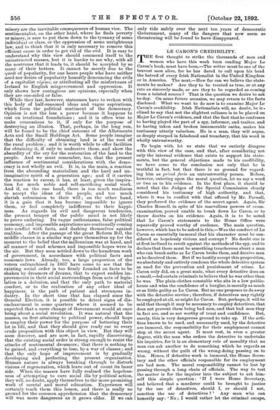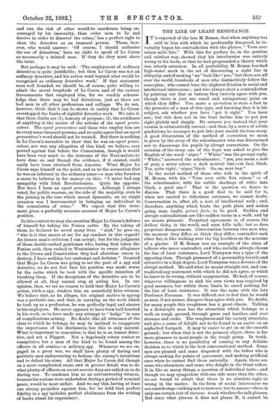LE CA.RON'S CREDIBILITY. T HE first thought to strike the thousands
of men and women who have this week been reading Major Le Caron's book, must have been,—The writer must be one of the bravest men alive, for he has dared to call upon his head the hatred of every Irish Nationalist in the United Kingdom or in America. The next,—How far can we believe the state. ments he makes ? Are they to be treated as true, or at any rate as sincerely made, or are they to be regarded as coming from a tainted source ? That is the question we desire to ask to-day. On some future occasion, we may return to the facts disclosed. What we want to do now is to examine Major Le Caron's credibility. Irish Nationalists will, no doubt, be it. dined to say that not the slightest reliance is to be placed on Major Le Caron's evidence, and that the fact that he confesses to having played the part of a spy, informer, and traitor, and to having taken and broken innumerable oaths, makes his testimony utterly valueless. He is a man, they will argue, so deeply steeped in falsehood and treachery, that his word is wholly untrustworthy.
To begin with, let us state that we entirely disagree with this view of the case, and that, after considering not only the internal evidence that exists to support his state- ments, but the general objections made to his credibility, we have come to the conclusion not only that he is truthful in fact, but that there is no ground for regard- ing him as prima' facie an untrustworthy person. Before, however, entering upon the moral question, let us say a word or two as to his evidence. In the first place, it should be noted that the Judges of the Special Commission clearly considered his testimony of high authority, and that, where it was in conflict with that offered by Mr. Parnell, they preferred the evidence of the secret agent. Again, Sir Charles Russell, in spite of his marvellous powers of cross- examination, proved unable to break down Le Caron, or to throw doubts on his evidence. Again, it is to be noted that Le Caron's statements to the Home Office were repeatedly proved worthy of credence. The main question, however, which has to be asked is this,—Was the conduct of Le Caron so essentially immoral that his character must be con- sidered as hopelessly vicious and corrupt P No doubt one is at first inclined to revolt against the methods of the spy, and to declare that there must be something treacherous about a man who can break oaths as Le Caron broke them, and deceive men as he deceived them. But if we hastily accept this proposition, we absolutely and entirely condemn the whole detective system as used for the prevention and punishment of crime. Le Caron only did, on a great scale, what every detective does on a small,—led certain criminals to believe that he was other than he was. The plain-clothes constable who sits in a low public- house and wins the confidence of a burglar, is morally as much or as little guilty as Le Caron. But no one proposes to do away with the detective service ; therefore, if detectives may rightly be employed at all, so might Le Caron. But, perhaps, it will be said that though it may be necessary to employ detectives, that does not prevent them being bad men, and that bad men they in fact are, and so not worthy of trust and confidence. Bat, surely, this is very dangerous ground to take up. If the arti- fices known to be need, and necessarily used, by the detective are immoral, the responsibility for their employment cannot stop at the secret agent. It must rest, in even a greater degree, with the man who orders the detective to undertake his inquiries, for it is an elementary rule of morality that no man can ask another to do something which he regards as wrong, without the guilt of the wrong-doing passing on to him. Hence, if detective work is immoral, the Home Secre- tary and the other officials responsible for its employment are bad men. The moral responsibility cannot be lost by passing through a long chain of officials. The way to test the matter is for the inquirer into the subject to ask him- self this simple question If I were Home Secretary, and believed that a murderer could be brought to justice by the use of detectives, should I, or should I not, sanction the use of detectives P' Any man who can honestly say : 'No; I would rather let the criminal escape,
and run the risk of other would-be murderers being en- couraged by his immunity, than order men to lie and deceive in order to discover the crime,' has a perfect right to shun the detective as an immoral person. Those, how- ever, who would answer : Of course, I should authorise the use of detectives,' have no right to speak of Le Caron as necessarily a tainted man. If they do, they must share the taint.
But perhaps it may be said : The employment of ordinary detectives is quite justifiable ; but then Le Caron was not an ordinary detective, and his action went beyond what would be recognised as ordinary detective work.' If that statement were well founded, we should be, of course, quite willing to admit the moral turpitude of Le Caron and of the various Governments that employed him, for we readily acknow- ledge that there may be bad detectives, just as there are bad men in all other professions and callings. We do not, however, think that it can be shown in reality that Le Caron overstepped the limits of rightful detective work. We take it that these limits are (1), honesty of purpose ; (2), the avoidance of anything in the nature of the actions of the agent provo- cateur. The agent provocateur and those who employ him are in every sense immoral persons, and we quite agree that an agent provocateur's word should not be trusted. But there is nothing in Le Caron's narrative to show that he was an agent provo- cateur, nor was any allegation of this kind, we believe, ever proved against him before the Commission, though it would have been very much to the interests of the Nationalists to have done so, and though the evidence, if it existed, could easily have been obtained from America. What Major Le Caron says himself on the point, and as to the accusation that he was an informer in the ordinary sense—a man who forsakes a cause he believes in for money—is this : "I never had any sympathy with Irish Revolutionists. Quite the opposite. Nor have I been an agent provocateur. Although I always voted, for politic reasons, on the side of the majority, even to the joining in the vote which meant dynamite, on no single occasion was I instrumental in bringing an individual to the commission of crime." We expect that this state- ment gives a perfectly accurate account of Major Le Caron's position.
In this context we may also mention Major Le Caron's defence of himself for taking the Fenian oaths. By the taking of them, he declares he saved many lives. "And," he goes on, -" who is it that sneers at me for my conduct in this regard ? An honest man's criticism I can accept ; but for the judgment of those double-oathed gentlemen who, having first taken the Fenian oath, then rushed to Westminster to swear allegiance to the Crown and Constitution they had aforetime sworn to destroy, I have nothing but contempt and derision." Granted that Major Le Caron was going to act the part of a spy and detective, we do not feel that his position was made worse by the oaths which he took with the specific intention of breaking them. If the deceptions of the detective are to be allowed at all, they cannot stop at acting lies. In our opinion, then, we see no reason to hold that Major Le Caron's action, while a spy, renders him an essentially false witness. We believe that, as he alleges, his original motive in spying was a patriotic one, and that, in carrying on the work which he took up as a profession, he was perfectly loyal and sincere to his employers. He never appears to have been half-hearted in his work, or to have made any attempt to " hedge" in case of complications arising. No doubt, like all witnesses of the class to which he belongs, he may be inclined to exaggerate the importance of his disclosures, but this is only natural. What is important to remember, is that he is an honest detec- tive, and not a Piggott. Not a hopelessly rotten traitor or conspirator, but a man of the kind to be found among the officers in all armies,—a military spy. Whenever we are en- gaged in a great war, we shall have plenty of daring and patriotic men endeavouring to fathom the enemy's intentions and to defeat his aims. All that Major Le Caron did, though on a more complicated stage, and in greater detail, was to do what plenty of officers on secret-service duty are called on to do during war. To condemn him as an untrustworthy witness, because his actions were undertaken during a period of nominal peace, would be most unfair. And we say this, having at least one strong prejudice against him, for we hold that perfect fidelity in a spy includes perfect abstinence from the writing of books about his experiencee.







































 Previous page
Previous page